Meet our MWL People
Join us as we showcase our amazing MWL People, working in a wide range of areas across the Trust.

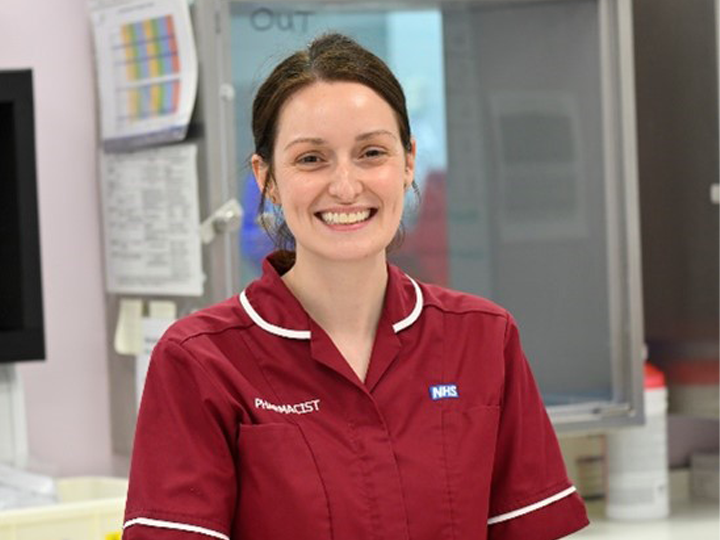
- Emma Carman, click here to read more
Emma is Principal Pharmacist at Southport Hospital and our Aseptic Services Manager.
“I’ve worked in the team at Southport Hospital for four years now. Aseptics is a way to prepare medicines in a sterile environment, particularly those which are classed as high-risk. This can include for example chemotherapy medication for haematology patients, and parenteral nutrition for adults and neonatal babies - parenteral nutrition is a way to feed people through an IV when they can't eat normally, it's like a completely balanced meal in a bag.
“Before this role I’ve worked in different pharmacy roles in other organisations, doing things like doing drug rounds on wards and speaking to patients about their medicines history. I’ve also worked on intensive care units, which can be really complex as you’re responsible for ensuring different medications can be safely administered at the same time to some of the most vulnerable patients.
“One of my core responsibilities is ensuring the aseptic unit operates to the highest sterility standards. To verify this, we carry out routine environmental monitoring by placing agar contact and settle plates in key areas of the cleanroom. These plates detect any microbial contamination in the air or on surfaces. The results are regularly reviewed, trended and externally audited to ensure full compliance with regulatory standards — giving assurance that the medicines we prepare are consistently safe for patients.
“I really like being part of the team here at Southport, and I like knowing that in my role everything I do contributes to safer treatment and better care for our patients”.
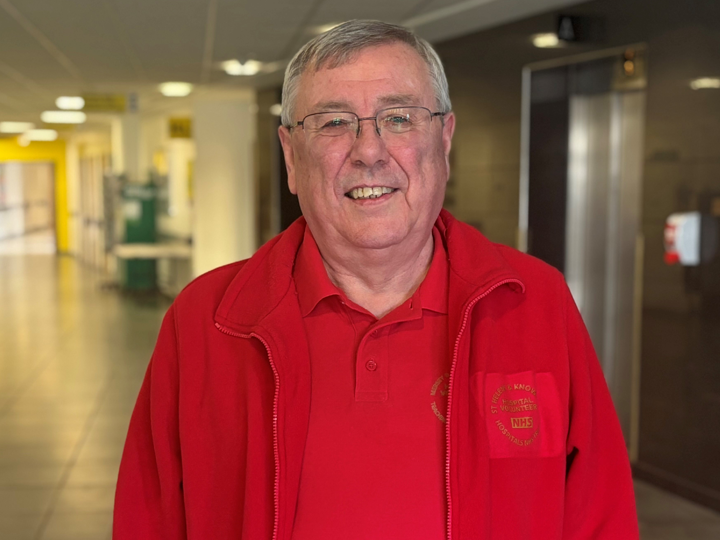
- Garry Beech, click here to read more
Garry is a volunteer at Whiston Hospital.
“I’ve been a volunteer here for 10 years now, ever since I retired. It was my partner’s idea – she’s worked at St Helens Hospital for over 40 years, so we’ve had a really long term relationship with the Trust. I thought it would be a great way of staying active, and it gets me out of bed in the morning.
“My role is a meet and greeter. I like being the first face people see when they arrive, helping people who might be a bit lost and not sure where to go. I also do medication runs for pharmacy, and I’m wheelchair trained so I can help our patients get around.
“I love coming here, I come in as often as I can! I’m happy to fill in gaps if other volunteers can’t make it in. The best part of the role is the people, you speak to visitors from all walks of life, and no day is the same. I love having a laugh with the other volunteers too. I’d absolutely encourage someone who was thinking about volunteering to join us”.
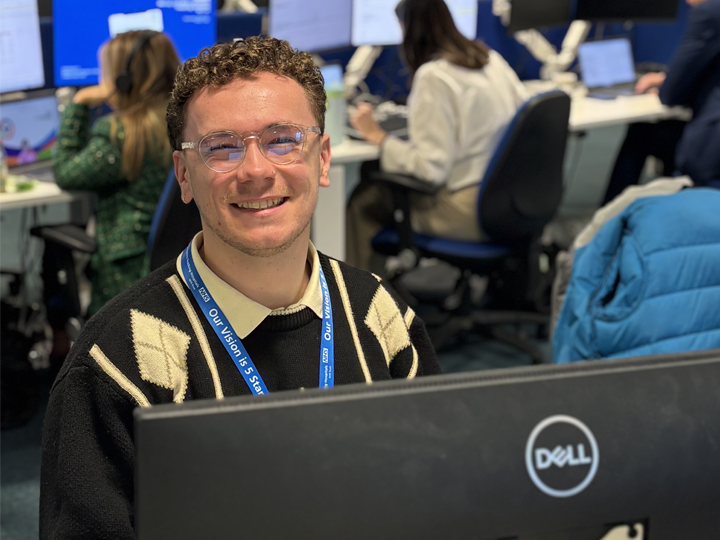
- Joe Pink, click here to read more
Joe is a Buyer in our Procurement team and works in our Knowsley offices.
“I’ve been at the Trust since 2019 and I’ve had several different roles in that time. I started as a Receptionist and doing general admin support, which I did at both Whiston Hospital and St Helens Hospital. After that I moved to Materials Management, which is all about making sure we have the correct clinical supplies for the staff looking after our patients – mainly disposable things like dressings and needles.
“For the last couple of years I’ve been working as a Buyer. When staff need a particular product, it’s our job to work with suppliers to get the best quality item for the most affordable price. Different members of our team have responsibility for different areas of the hospital, and mine is surgery, so these are life-saving products.
“I love it here at the Trust. I’ve seen how skilled our staff are, and how much they care about providing the best care. I feel really happy to be part of Procurement too, I couldn’t wish for a better team. We were one of the first teams to come together when we became MWL, and I just think we work better than ever. If someone said they were thinking about joining the Trust, I’d say grab the opportunity with both hands, you won’t regret it”.

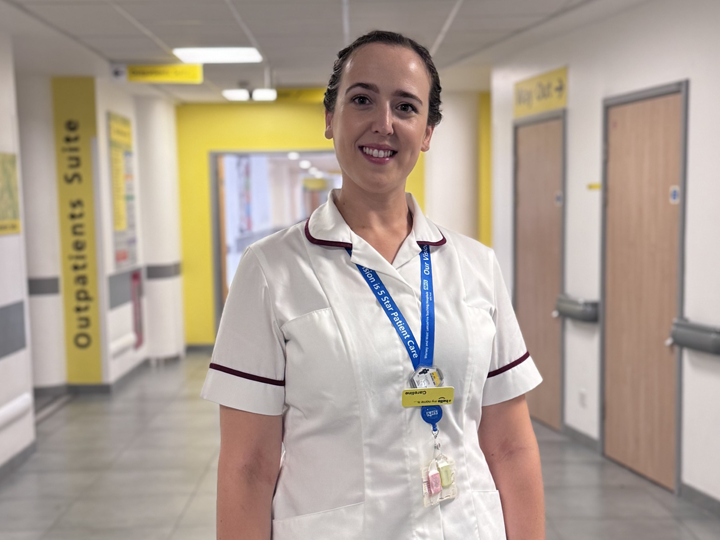
- Caroline Coletto, click here to read more
Caroline is one of the Trust’s MRI Lead Radiographers.
“I’ve been at the Trust for 8 years now in the Radiology Department. My role is specifically focused on MRI safety. Making sure that the patients we scan and the staff working in those areas are safe is a key part of my role. The scan room and surrounding work spaces are classed as controlled areas because the scanner is a very powerful magnet. As well as performing scans, part of my role includes ensuring our radiology policies and procedures meet safety regulations.
“MRI safety is a developing area, which is why I find it so interesting. In the past, we wouldn’t have dreamed of scanning patients who have a pacemaker fitted for example, but now we are able to do this safely if MRI conditional. This opens up the benefits of MRI scanning to more patients. As we’re an acute hospital with an A&E Department, you never know who will come through the door, which means every day is different.
“Our department mixes with a lot of different teams which is fab. We work alongside clinical psychology for patients who experience claustrophobia, to provide them with support including coping techniques and therapy. We also work with the Pacing Team, who are pacemaker specialists, and Radiology nurses who monitor patients during scans and the Theatre teams. The best part of my job is getting to interact with our patients and help them on their patient journeys by producing good quality diagnostic images.
“I first came to the Trust on an Open Day, and I really liked the feel of the place. I could have applied to another hospital closer to home, but I didn’t want to work anywhere else. When you qualify as a radiographer you mainly perform x-rays, so while I’ve been here I’ve learnt to do CT scanning, and MRI scanning too. The Trust has been really supportive of my training and I have achieved my post graduate certificate and qualified as an MRI Safety Officer. I want to continue progressing in this area, there’s so much to keep learning”.
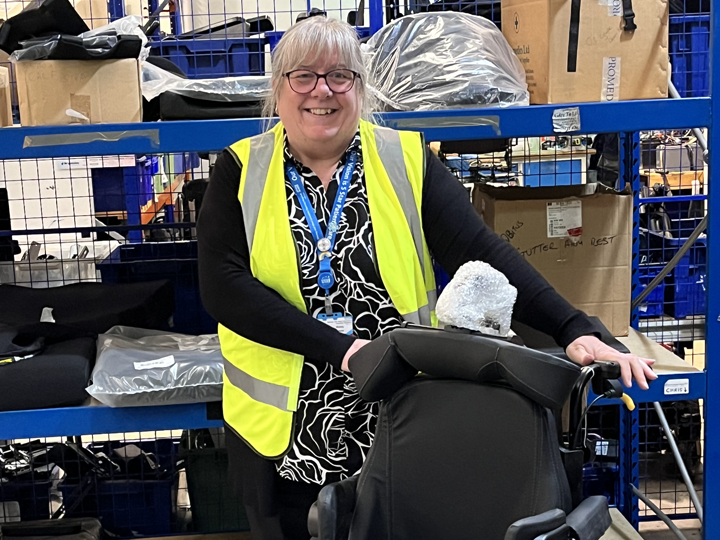
- Wendy Heyes, click here to read more
Wendy is our Wheelchair Service Administrator, and has worked in the team for over 20 years.
“When people come to our service, one of our therapists assesses them, and writes a prescription for the sort of wheelchair they require. It’s my responsibility to order it, and make sure that we provide a wheelchair that meets their specific needs. Some patients have very specialist needs, for instance a seat that is moulded specifically for them and supports their posture.
“I think the youngest patient I’ve provided a wheelchair for was 4 years old, and the oldest was 104! It’s lovely to see the smiles on the children’s faces – some I recognise as they grow up and come back for larger wheelchairs, and it’s really nice to build a rapport over time. Though we’re out in the community we have very good relationships with other teams in the Trust, such as our colleagues in the Spinal Injuries Unit, and occupational therapists, and we get referrals from Therapies, District Nurses, and GPs.
“I’ve really enjoyed taking on new responsibility over my career. I love getting positive feedback, I’ve been called the ‘mum’ of the service! Knowing that the role I do, I’ve done my bit for our patients, that gives me a lot of job satisfaction. My husband used to work here too doing wheelchair repairs before he retired – I would order the wheelchairs and he would refurbish them! I could retire myself in a few years, but I find it hard to think about leaving here, and I couldn’t ever see myself working anywhere else”.
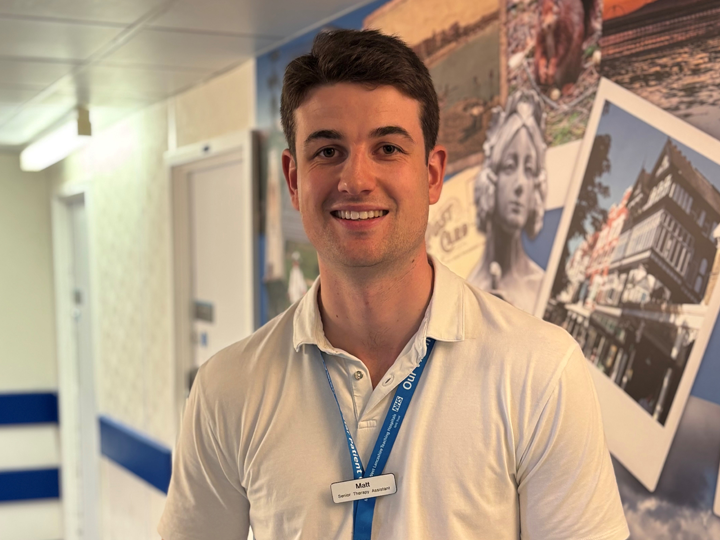
- Matt Black, click here to read more
Matt is a Senior Therapy Assistant at Southport Hospital.
“I started working at Southport Hospital a few months ago and it’s been great so far. I’m based on an acute trauma and orthopaedic ward, where we work with patients who have had fractures, dislocations, and total hip or knee replacements. The patients on our ward haven’t planned to be here, they’re here because of accidents or injuries. Our shared goal is to get them back on their feet and back home as soon as possible.
“My role as a Senior Therapy Assistant is to support the qualified therapists in the team. This involves things like helping the safe movement and transfer of patients, ensuring proper positioning in bed to prevent pressure sores, supporting their mobility out of bed, and issuing out or ordering in the correct equipment to ensure patients are going to be safe once discharged from the hospital.
“I graduated from my Sport Rehabilitation degree in 2021 from Leeds Beckett University. I have since worked self-employed in private physiotherapy clinics, and for amateur sports teams in addition to part-time work for the NHS community stroke team in Warrington. It’s a really different experience here in the hospital – a quicker pace, and the sense of working alongside the rest of the multi-disciplinary team. I feel we really complement each other. I like the buzz of the hospital but it’s understandable that our patients can find it a little scary to be here so we do all we can to help them feel safe and comfortable.
“I’ve always been interested in caring for people, it’s really rewarding. The team here has a big part to play for me, I’ve only recently started but they’ve welcomed me with open arms, making me feel involved and included, and helping me with building hands-on experience”.
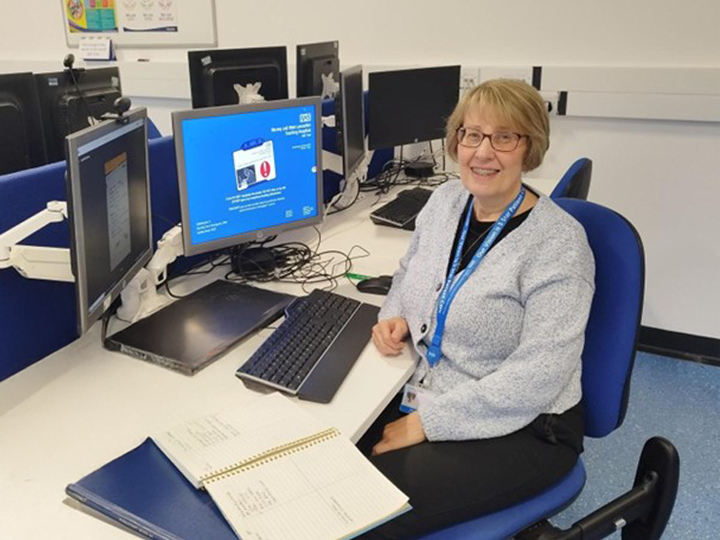
- Pat Broughton, click here to read more
Pat is a Business Support Officer at our Trust and works in our Jubilee Court offices.
“I’ve been in this role for eight years now. A friend suggested I apply for a job on the staff bank, and after six months I was enjoying myself so much I decided to apply for a permanent position.
“It’s my job to support the teams here with technology. I help new members of staff, doing things like setting up their email accounts or devices that they need to do their jobs. I like problem solving – some fixes I can do myself, and others I liaise with teams like IT to help resolve.
“I enjoy how my job means I get to interact with so many people face to face. I like going into work every day – there’s never a day I don’t want to be here! I’m proud to work in a public service, and I feel proud when my family come into our hospitals for treatment knowing that I’m part of the team”.
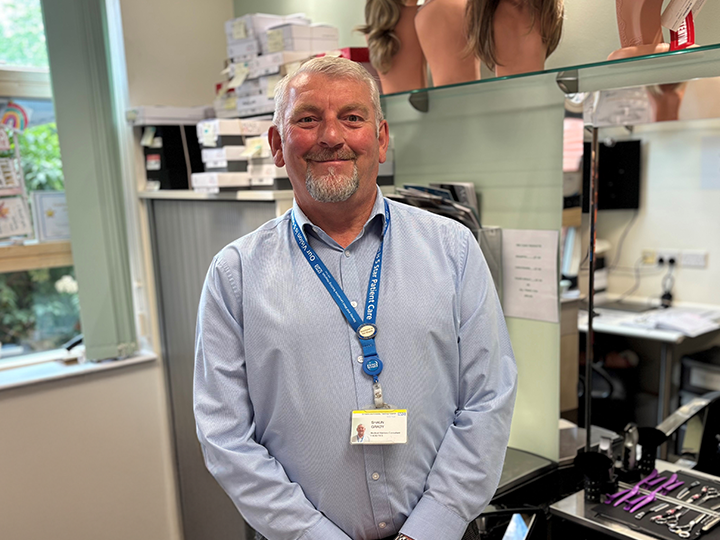
- Shaun Grady, click here to read more
Shaun is Medical Hair Loss Consultant at St Helens Hospital. Shaun has worked at our Trust for almost 39 years!
“I’m in charge of all hairdressing as well as the wig making and fitting service at MWL. My role is all about supporting patients experiencing hair loss, predominantly those who are undergoing chemotherapy for cancer, but also for those with alopecia or burns. I’ve done this job for about 25 years now.
“Our patients come in before they start their chemotherapy, which means that we’re able to replicate the style they have once they’ve begun their treatment. When they come in for their next appointment at the salon we fit their wig, cut and personalise it for them. They have enough going on without having to worry about changes to their appearance – we want to help give them some sense of normality.
“We’re fussy and we want to get it right! Some patients think that because our wigs are provided for free on the NHS that they might be inferior quality, then they are genuinely blown away when they see how high-quality the result is. I’ve been told by patients that their wigs looked so real, their friends haven’t realised they’ve lost their hair! And as their hair grows back we help them with styling it too.
“We’re so fortunate we can do this for our patients, here at the Lilac Centre, in an environment where they trust the staff and feel safe. Their feedback means so much. I just love the job, the best part is seeing the genuine surprise and sometimes even happy tears when our patients see the finished wig”.
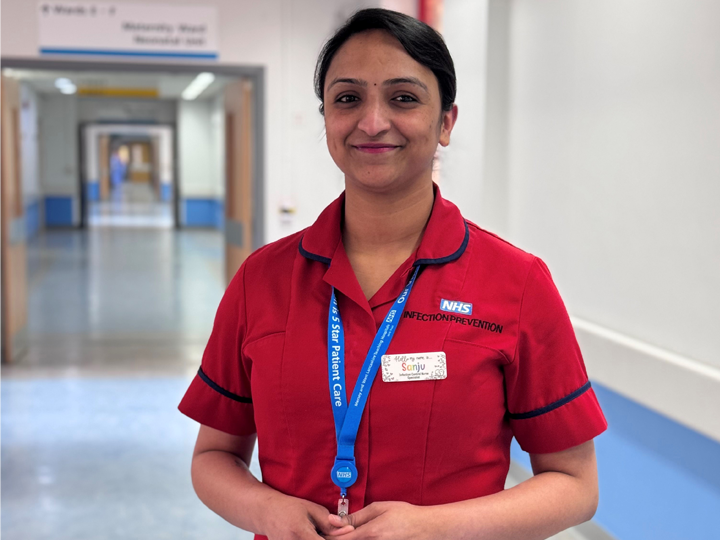
- Sanjumol Yohannon, click here to read more
Sanjumol is an Infection Prevention and Control Specialist at Southport Hospital.
“I moved to the UK in 2020 after 10 years of working as a staff nurse and ward manager in my home country India. That was during the Covid-19 pandemic which was really difficult, but I felt so wonderfully supported and welcomed by the team when I arrived. After 3 years I moved into my current role as a secondment because I was looking for a new challenge, and an opportunity to make a positive impact.
“As a nurse, infection prevention and control is at the heart of what we do, and in my role I use my experiences of delivering direct patient care to understand how to best support our ward staff. The scope of the role is really wide: I conduct daily ward rounds, provide specialist advice and support to staff, monitor the effectiveness of infection prevention processes, educate and train staff, and research and review new medical products such as medical equipment and cleaning items. I also advocate for and contribute to a culture of safety where infection prevention is prioritised.
“Throughout my career I’ve been inspired by the Florence Nightingale quote: ‘Let us never consider ourselves finished nurses. We must be learning all of our lives’. Infection prevention and control is everyone’s responsibility, and we can all do our bit to keep ourselves and others safe – as staff, patients, and visitors. I see my role as helping to empower people to do this.
“My favourite thing about MWL is how inclusive it is. It’s not easy to come to a new country and a new culture but I felt very supported, and I’m so happy I made the decision!”

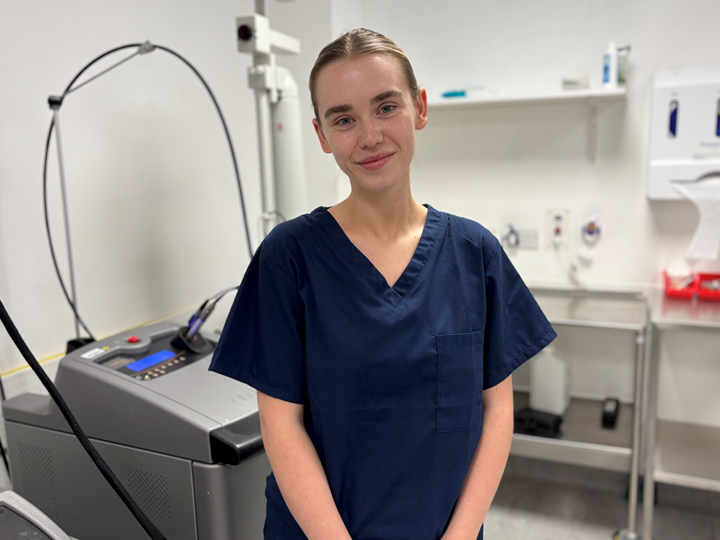
- Jess Roberts, click here to read more
Jess is a Laser and Micropigmentation Specialist at St Helens and Whiston hospitals.
“I started working at the hospital straight after college when I was 17! I’ve now been in the department for six years.
“There’s a number of different interventions our team can do to support patients. Using the laser we can help mask the appearance of scarring, which can mean a lot to a patient who might feel self-conscious after surgery for instance. We also do micropigmentation, which is like tattooing the skin – one thing we use this for is to recreate the appearance of a nipple following breast reconstruction surgery after cancer treatment.
“Our patients are always so happy with the support our department offers, after being through something so challenging it can really help them to move past it. My role is really varied and interesting. I see it primarily being about supporting patients to move forward in their lives once their treatment is completed.
“I’m really interested in research. I’ve recently been part of a study looking into the benefits of lasering burns scars earlier for better outcomes for patients. If I was to give advice to someone who was just leaving college, I’d say join the NHS and see if you can get involved in apprenticeships. I’ve been lucky enough to do multiple apprenticeships at the Trust to expand my skills and help me develop. I love it here, seeing so many different patients, and working with staff from lots of different roles”.
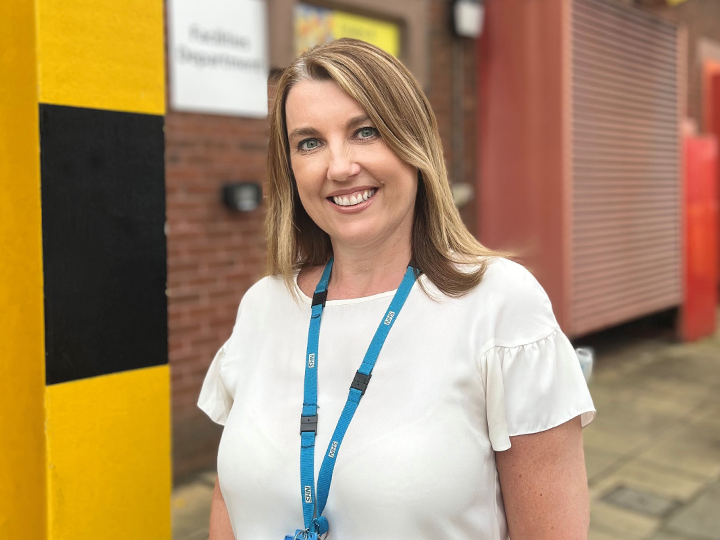
- Susie Rickers, click here to read more
Today is National Healthcare Estates and Facilities Day, so what better time to introduce Susie, an Estates and Facilities Administrator at Southport Hospital.
NHS Estates and Facilities teams manage and maintain NHS buildings, grounds, and related services, ensuring safe and functional environments for staff and patients.
Susie has worked at our Trust for almost three years. She explains how her role is essential to maintaining a safe and efficient hospital environment.
"I love working as an Estates and Facilities Administrator. Every day is dynamic and impactful. Whether I'm answering queries, raising purchase orders, or signing in contractors, I know that my role is essential to maintaining a safe and efficient hospital environment.
“Collaborating with a fantastic team, supporting our staff and enhancing the patient experience gives me a real sense of satisfaction and pride in the work I do."
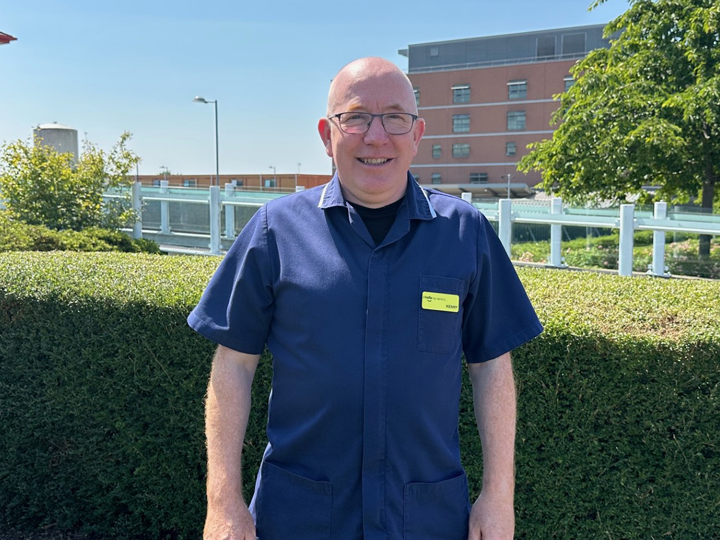
- Kenny Jones, click here to read more
Kenny is a Learning Disability and Autism Practitioner at Whiston, St Helens, and Newton hospitals with over 30 years experience in the NHS.
“Right from the start I knew I wanted to be in a caring profession. When I was growing up, my mum worked with people with learning disabilities and it made me aware of the challenges people can face and the importance of treating everyone as individuals. I wanted to be able to do my bit and be a support to people too.
“I’ve worked at MWL for 5 years now. My role is varied: I spend time out and about across our hospitals supporting patients and their families, I work alongside the multi-disciplinary team to enable reasonable adjustments to be made, and I also train staff so that they know how best to meet the needs of those with a learning disability. My favourite thing about the job is supporting patients who may be anxious or distressed about coming in to hospital – seeing the impact you can have in reassuring someone and helping them to feel comfortable is really meaningful. Getting the feedback that you’ve made a difference is amazing.
“What I love most about MWL is the teamwork and the passion of our staff. I work particularly closely with the staff in A&E, on the wards, and in anaesthetics, but I can go anywhere – dental, x-ray, ophthalmology - wherever I can be of help to our patients”.

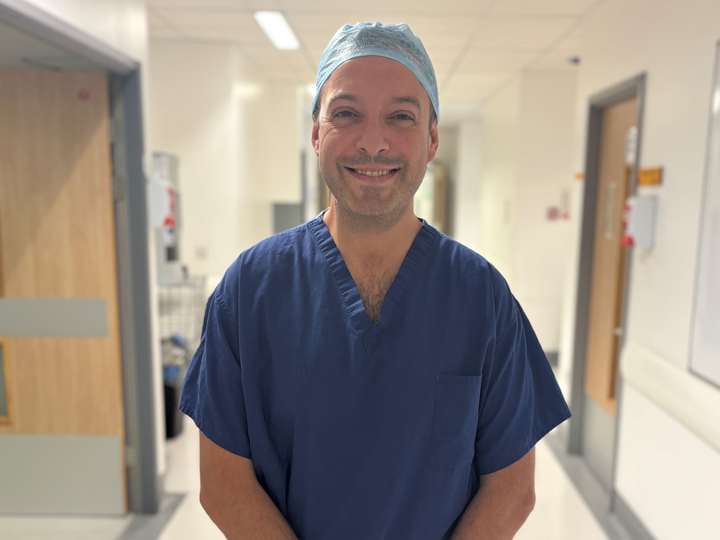
- Kev Parr, click here to read more
Kev is an ODP and Clinical Practice Lead for Anaesthetics at Whiston Hospital.
“I started at Whiston Hospital in 2006 as a Sterile Service Technician, a valuable role that involves cleaning and preparing instruments for surgery. From there, I found out about ODPs and the great work they do in Theatres, supporting patient care in surgical procedures. In 2010 I began my three years of ODP training, which is 50:50 practical experience and academic learning.
“ODPs work across three main areas: anaesthetics, surgery, and recovery. I see the role as being one of great responsibility but also great privilege – ODPs are the last people our patients see before their operation, and the first they see when they wake up after surgery. Being in Theatres is our day job but for our patients it might be the biggest day of their life, and it’s so important we do all we can to help them to feel safe and supported.
I’m really passionate about the ODP role and recently I’ve been going to careers fairs in schools to let kids know about the huge range of roles there are for a future in the NHS. Over the last 18 months I’ve taken on the role of Clinical Practice Lead for Anaesthetics, meaning I’m now particularly focused on the education and training of my colleagues in Theatres which I really enjoy. Working in Theatres has an overwhelming feeling of teamwork and every staff member plays their own important role”.
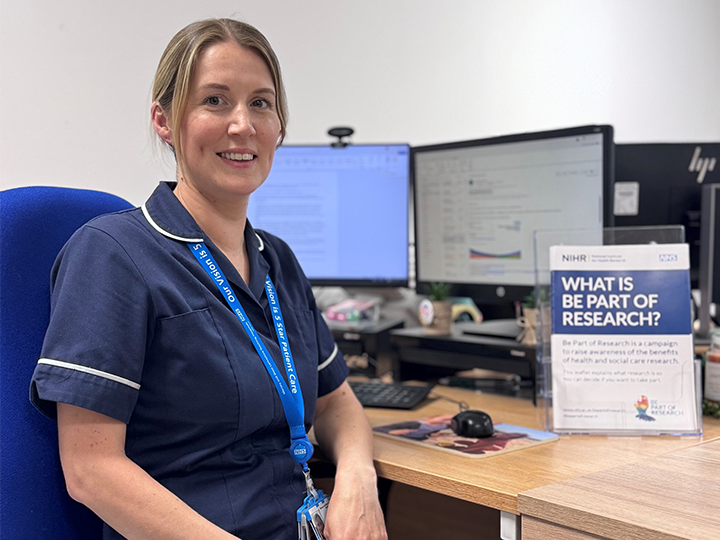
- Kerri Bowness, click here to read more
Kerri is a Paediatric Research Nurse at Ormskirk and Whiston hospitals. She’s passionate about working in clinical research and contributing to future healthcare for young patients.
“I originally spent 11 years working on the general paediatric wards as a staff nurse. I really enjoyed my time on the wards, working with newborn babies all the way up to teenagers. Whilst I was there, I started to get involved with research and audit and worked on a clinical audit into the effectiveness of care received by children with epilepsy. After a while I wanted to specialise in my career and make research my main focus.
“Being in research is busy like the wards but it is completely different, it involves assessing the feasibility of new studies, setting up research clinics, screening and identifying patients, there’s always a lot going on. I’ve been fortunate to be involved in various paediatric studies, such as asthma, allergies, and respiratory syncytial virus. At the moment I’m working on a study of a new rice milk formula that could be used for feeding infants with a cow’s milk protein allergy.
“Studies can last for several months and sometimes years. You really get to know the children and their families, build a relationship, and watch them grow up. Depending on the study, we can see symptoms improve and patients getting better which is wonderful.
“If we didn’t do research, nothing would improve in healthcare, there wouldn’t be any new treatments or drugs. That’s why we’re really grateful to the patients who take part in our trials, we couldn’t do any of this without them”.
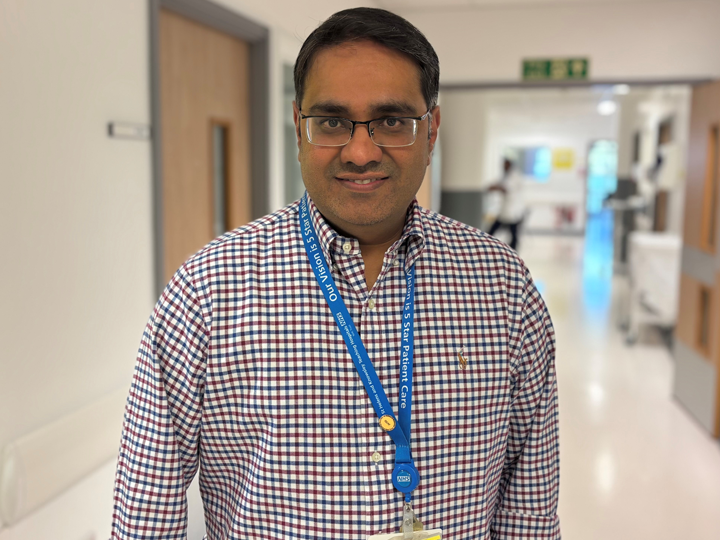
- Ragit Varia, click here to read more
Ragit is a consultant in acute medicine, and lead for Same Day Emergency Care, based at Whiston Hospital. He has also been involved in number of successful clinical and digital projects at the Trust.
Ragit says: “I have worked for the Trust since 2012 where I have the pleasure of working with an incredibly talented, hard-working and close-knit team on the Acute Medical Unit (AMU).
“I am particularly passionate about developing systems and services. On AMU, we have set up a digital innovation and sustainability group of like-minded colleagues with work featured recently on the Royal College of Physicians (RCP) Green Physician Toolkit and awarded by the Society for Acute Medicine (SAM) sustainability group ecoSAM.
“I am the regional Acute Kidney Injury (AKI) lead with Advancing Quality Alliance (AQUA) and am ever so proud of leading the Whiston AKI Team. The expertise of our specialist nurses, pharmacist and nephrologists within a department, grown from scratch at Whiston, has improved the quality of care and experience for our patients significantly.
“Working with diverse, multi-professional and supportive colleagues on my unit and within the organisation and with an Executive Team that has always been supportive, has indeed been a great privilege’’

